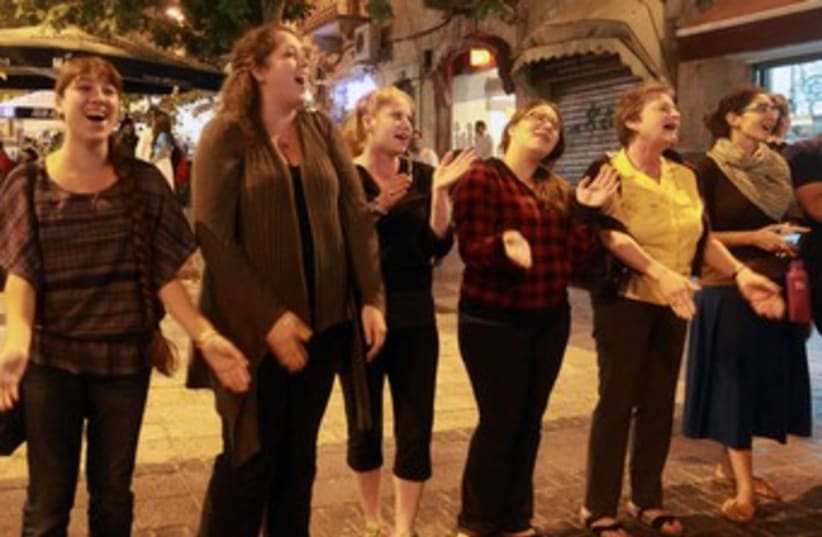Twenty-six women will sit in Israel’s freshly elected 19th Knesset, a new peak that seems to be going in the direction of a larger and larger representation of women in the political sphere.
At the same time, an opposite trend can be seen in another part of Jerusalem: at the Wailing Wall, where the space that is set aside for women has shrunk over the years to a mere 12 meters of its total length. These two trends highlight an interesting parallel between the most ancient and the most modern places representing the Jewish people in the Land of Israel - women count for only 20% in both.
And the women wishing to worship at the Western Wall are suffering further humiliation: whereas women in the Knesset are there to have their voices heard, devout women at the Kotel have had their voices silenced for fear of arrest.
The paradox in all this is that Jewish religious law, which should logically be taken into consideration at a Jewish holy site, does allow women to read from the Torah; it is a ruling from the Jewish State's High Court of Justice that doesn’t. The reason for it is to be found in a 15-year legal struggle between Women of the Wall, a multi-denominational group of women seeking to pray, according to the Halacha, in the women's section of the Kotel, and an intolerant Haredi community, represented in the Knesset by two parties (Shas and United Torah Judaism) which together can usually count enough seats to hold quite a grip on any coalition. Over the years, many of WoW's members have been insulted, harassed, mistreated and even arrested for trying to pray out loud (or wearing a halachically permitted Tallit) in front of the Wailing Wall – something that apparently outrages the ultra-Orthodox worshippers whom one would expect to be too busy praying to bother.
It should be noted that the request of WoW was simple: permission to worship at the Western Wall for one hour, once a month, on the first of the month - excluding the first of the month of Tishrei: 11 hours a year in total. Following two verdicts that demanded of the government "to find an appropriate way to enable WoW to actualize their prayer in good faith, according to their custom, at the Kotel Plaza", in 2003 the High Court of Justice (pressured by a Knesset in which the ultra-Orthodox held no less than 22 seats) agreed to have another discussion on the issue and eventually overturned its previous verdicts by granting WoW the right to pray at Robinson's Arch, which is an extension of the Wall but certainly not the Kotel itself.
In other words, it is as if some members of parliament were required to work in the hallway of the Knesset and yet pretend they were sitting in the main assembly: a self-evidently unacceptable arrangement. However, sitting in the Knesset and standing at the Kotel should deserve the same dignity and the same commitment to equal rights.
It is my personal belief that if a Haredi man is troubled by the appearance of a woman who is walking in the street, he's more than welcome to look the other way. The street does not belong to him more than it belongs to others. In the same way, the Wailing Wall should not belong to Haredim more than it belongs to the rest of the Jewish People, for it is holy to all of us in the same way. If an ultra-Orthodox man is bothered by the voice of a woman worshipper, and considering he has four times more Wall to pray at than her, he's more than welcome to walk a few meters to his left in order not to hear her anymore. To be even more accommodating, I suggest WoW also walk a few meters on their right (not a few hundreds until they reach Robinson's Arch, though): this way everyone will be able to pray at the Kotel, without interfering with each another.
In the aftermath of the recent elections, while Israel waits for the new coalition to be announced, I cherish the intimate hope that the female 20% of the new Knesset will somehow manage to set things straight for the other 20% at the Wall, and not in its antechamber. This (alas, highly remote) possibility depends, among other things, upon the exclusion of the ultra-Orthodox parties from the new coalition. If Lapid keeps his word and refuses to sit in a coalition with Shas and UTJ, a first step in the right direction could be made.
Israelis have had their voice heard on the day of the election of the 19th Knesset: it is high time all women who wish t o pray at the Kotel had theirs heard too.
Nadia Ellis is a Fellow at the Jewish People Policy Institute, where she works on issues related to the status of women in the Jewish People.
